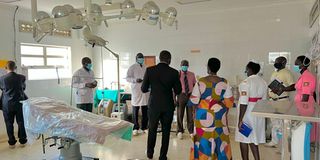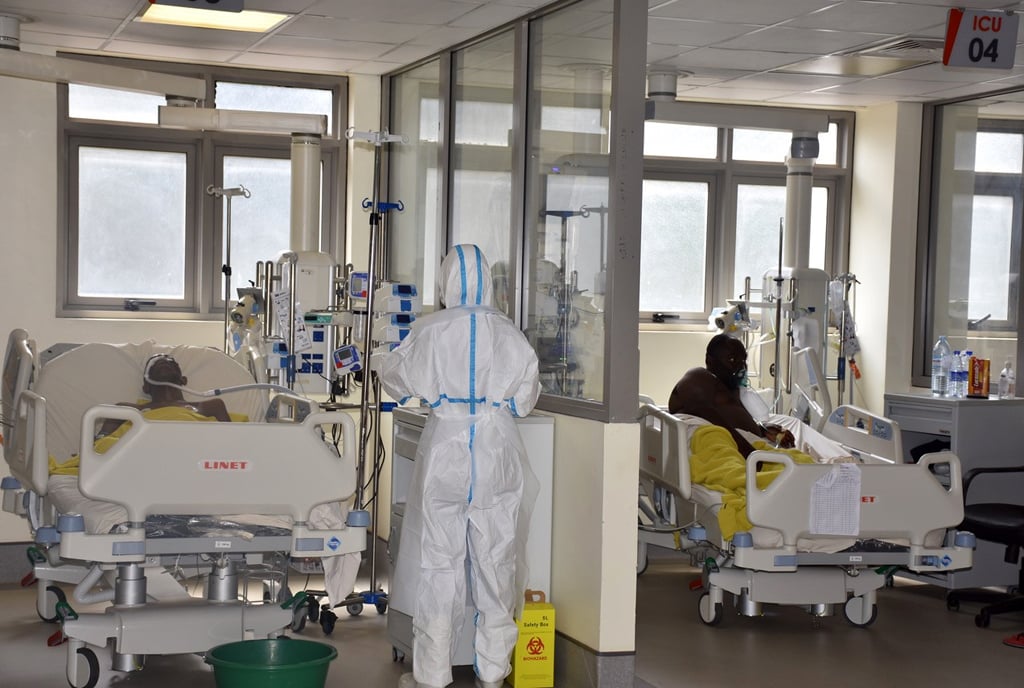Govt to re-table compulsory Health Insurance Bill

Ministry of Health PS Diana Atwine and other government officials inspecting Kaabong General Hospital on February 10, 2022. The Health minister, Dr Jane Aceng, has said the National Health Insurance Scheme (NHIS) Bill will be re-tabled before Parliament in two months for approval after her ministry has revised it. PHOTO/ COURTESY
What you need to know:
Dr Jane Ruth Aceng said the government bounced back the Bill to the ministry for adjustments
The Health minister, Dr Jane Aceng, has said the National Health Insurance Scheme (NHIS) Bill will be re-tabled before Parliament in two months for approval after her ministry has revised it.
Parliament first passed the NHIS Bill, which seeks to provide universal healthcare to all Ugandans, last year despite calls by the Health ministry to withdraw it for key adjustments.
Addressing legislators and scientists yesterday in Kampala, Dr Aceng said the government bounced back the Bill to the ministry for adjustments.
She said some key stakeholders in the private sector were not in agreement with provisions regarding the contributions to the NHIS and how the funds will be managed without any taint of corruption.
“This Bill went to Parliament, we attempted to withdraw and later on it was formally sent back to us. This is because when we had a meeting with the President in the presence of several stakeholders. The stakeholders were of the opinion that cutting money from the salaries of workers is not fair. The issue of solidarity was not welcomed,” Dr Aceng said.
“The workers are also complaining that they receive too little and then again we are looking at sharing, the rich subsidising the poor. People are not happy about that,” she added.
In the Bill, people employed in the formal sector are expected to contribute 4 percent of their salaries backed up by one percent from their employers. Individuals in the informal sector are expected to contribute Shs100,000 annually.
But the minister said the industry group said asking them to supplement their workers would increase the cost of doing business and the prices would go up.
“Who would pay for the indigents? Is it government? Will the indigents continue receiving services for free? Can people appreciate services when they don’t contribute anything? Those questions were laid down on table and the workers were not happy with what we submitted,” she said.
Dr Aceng, however, said they have done most of the work to address the questions in the draft Bill.
“We are only remaining with three more consultations and the Bill will come back. The agreement was that having only few people subscribing is not acceptable. Every Ugandan and non-Ugandans who receive health services in Uganda must subscribe. Insurance should be for all the basic health services,” she said.
“Even the old people must pay, even if it is Shs5,000. The payment will be broken down depending on your income. Boda bodas will pay a certain amount, MPs, commissioners will also have particular amount they will pay,” she added.
The heads of hospitals told this newspaper that the government should pick a leaf from other East African countries and expedite the operationalisation of the NHIS to access to quality health care and save more lives.
Dr Mahmoud El-gazar, the chief executive officer of Kibuli Muslim Hospital, said there is evident increased access to timely, quality and affordable health care by citizens in countries that had embraced the NHIS.
“The National Health Insurance is overdue, but better late than never. We are not any different from Rwanda, Tanzania and Kenya who have taken it up. We should emulate them,” he said.
Uganda is said to be the only country in East Africa that has not operationalised NHIS.
Dr Rosemary Byanyima, the deputy director of Mulago National Referral Hospital, said the government should expedite the NHIS implementation to address frustrations patients face and bring down preventable deaths.
“National Health Insurance Scheme will increase health financing. This will enable hospitals, even those upcountry, to be equipped with machines like CT scan so they don’t travel up to Mulago Hospital for the services,” she said.
Dr Byanyima, however, urged the government to refine the implementation strategies, especially the monitoring aspect, to create a robust confidence in Ugandans towards the scheme.
Dr Celestine Barigye, the Mbarara Regional Referral Hospital director, said the NHIS will address out of pocket spending, a critical bottleneck in access to quality services, especially among those who cannot afford it.
Specialized services excluded
Dr Ruth Aceng said specialised services will not be part of the NHIS because they are very expensive. “They will have a separate insurance. For basic insurance, it is for all of us but for the specialised, it is another category. After that, we shall be on the same page with everyone,” she said. “The next challenge is how to collect the funds. How to safely collect the funds and direct to areas of need without corruption, are the last discussions. When we are done with that, maybe in the one or two months, we will take it [the draft Bill] to cabinet and then to Parliament,” the minister added.



